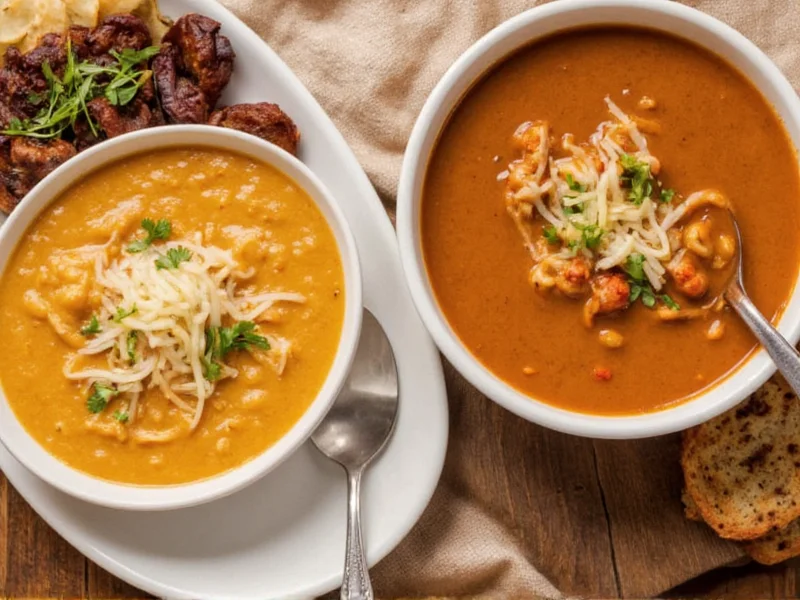For more than three decades, Olive Garden has built its reputation on generous portions of Italian-inspired comfort food, with soups serving as a cornerstone of the dining experience. These carefully crafted starters have become so popular that many guests consider them essential to their meal. Understanding what makes each soup unique helps diners make informed choices based on flavor preferences, dietary needs, and meal pairing considerations.
Year-Round Soup Menu at Olive Garden
Each soup on Olive Garden's permanent menu features distinctive ingredients and preparation methods that have remained consistent while occasionally receiving subtle recipe refinements. Here's a detailed breakdown of what you can expect:
| Soup Name | Key Ingredients | Dietary Notes | Flavor Profile |
|---|---|---|---|
| Zuppa Toscana | Italian sausage, potatoes, kale, cream, chicken broth | Contains dairy, gluten, meat | Rich, creamy with spicy sausage notes |
| Pasta e Fagioli | Ditalini pasta, cannellini beans, tomatoes, garlic, herbs | Vegetarian option available (request without meat) | Hearty, tomato-based with bean texture |
| Minestrone | Seasonal vegetables, beans, pasta, tomato broth | Vegetarian, contains gluten | Light, vegetable-forward with herb notes |
| Chicken & Gnocchi | Chicken, potato gnocchi, mushrooms, cream, herbs | Contains dairy, gluten, meat | Creamy, comforting with earthy mushroom notes |
Practical Ordering Information
Understanding how Olive Garden serves its soups helps maximize your dining experience. Each soup comes in two standard portions:
- Small Soup - Served as a starter before your entrée (included with certain lunch specials)
- Large Soup - Can be ordered as a meal with salad and breadsticks (available for dinner)
Current pricing for soup-only orders ranges from $5.99-$7.99 depending on portion size and location. Many locations offer soup refills during lunch hours, though policies vary by franchise. For those with dietary restrictions, servers can provide ingredient lists to help identify potential allergens or dietary concerns.
Seasonal Soup Offerings
Olive Garden occasionally introduces limited-time soup specials that showcase seasonal ingredients. The most notable seasonal offering is:
- Seafood Shanty Chowder - Typically available during winter months, featuring clams, shrimp, potatoes, and bacon in a creamy broth
These rotating specials often draw inspiration from regional Italian coastal cuisine while incorporating American chowder traditions. When available, seasonal soups follow the same portioning and pricing structure as the permanent menu items.
Nutritional Considerations
For health-conscious diners, understanding the nutritional profile of Olive Garden soups helps make informed choices. While exact values vary by portion size, general nutritional information includes:
- Zuppa Toscana (large): Approximately 380 calories, 22g fat, 24g carbohydrates, 19g protein
- Pasta e Fagioli (large): Approximately 270 calories, 7g fat, 41g carbohydrates, 11g protein
- Minestrone (large): Approximately 190 calories, 3.5g fat, 35g carbohydrates, 7g protein
- Chicken & Gnocchi (large): Approximately 350 calories, 18g fat, 32g carbohydrates, 16g protein
Vegetarian diners should note that while Minestrone is vegetarian, Pasta e Fagioli traditionally contains a small amount of pork for flavoring unless specifically requested without. Always confirm preparation methods with your server if you have strict dietary requirements.
History Behind the Soups
Olive Garden's soup program began in the late 1980s as part of the restaurant's "When You're Here, You're Family" philosophy. The original menu featured just two soups: Zuppa Toscana and Pasta e Fagioli. These were developed by culinary teams seeking to translate authentic Italian regional recipes into approachable American-Italian dishes.
Minestrone was added in the 1990s to provide a lighter vegetarian option, while Chicken & Gnocchi joined the permanent menu in the early 2000s. Each soup has undergone minor recipe adjustments over the years to maintain consistency across locations while adapting to evolving ingredient availability and food safety standards.
Maximizing Your Soup Experience
For the best experience with Olive Garden soups, consider these practical tips:
- Ask for your soup to be served in a bowl rather than a cup for better temperature retention
- Request breadsticks on the side of your soup bowl for easier dipping
- Combine a small soup with a salad for a lighter meal option
- Inquire about current seasonal specials that might not appear on the standard menu
- Consider ordering soup as a side with certain entrées like chicken dishes or seafood
Many regular customers appreciate that Olive Garden maintains recipe consistency across locations, making the soups a reliable choice whether dining locally or while traveling. The soups' popularity has also inspired numerous copycat recipes, though the restaurant's commercial preparation methods and ingredient sourcing create a distinctive flavor profile difficult to replicate at home.











 浙公网安备
33010002000092号
浙公网安备
33010002000092号 浙B2-20120091-4
浙B2-20120091-4